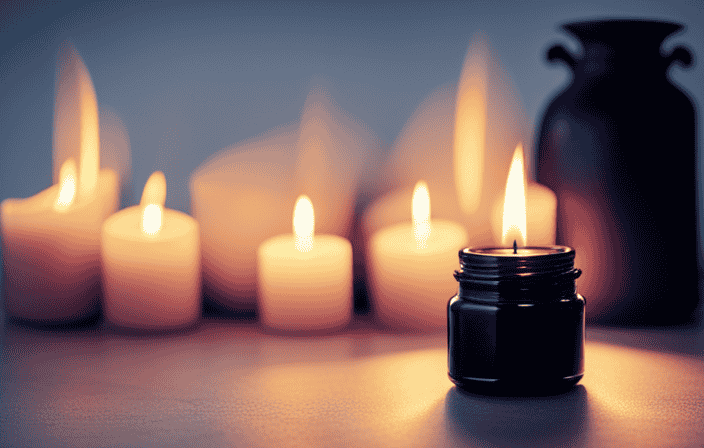Dreams
Dreams Where You Can’t Move

As someone who has personally experienced it, I understand how scary it is to wake up from a deep sleep and be unable to move. It feels like your body is paralyzed while your mind is filled with fear and disorientation.
This phenomenon is known as sleep paralysis, and it affects millions of people worldwide. Despite being a relatively common occurrence, sleep paralysis remains shrouded in mystery and misinformation. Many people believe that it is caused by supernatural forces or demonic possession, but the truth is far less dramatic.
In this article, we will dive into the science behind sleep paralysis, explore its causes and symptoms, and provide you with coping strategies and prevention techniques that you can use to overcome this unsettling experience. So sit back, relax (if you can), and let’s explore the world of dreams where you can’t move.
Key Takeaways
- Dreams where you can’t move are a type of sleep paralysis that can be a frightening experience, leaving one feeling vulnerable and helpless.
- Sleep paralysis occurs when the brain fails to transition smoothly between different stages of sleep, specifically from REM sleep to wakefulness.
- Sensory experiences during sleep paralysis can include auditory, visual, and tactile hallucinations, as well as lucid dreaming and out-of-body experiences.
- Sleep paralysis can be managed with effective treatment options, but there is no cure for this condition. Establishing a consistent sleep schedule and maintaining a healthy sleep hygiene routine can prevent dreams where you can’t move.
What is Sleep Paralysis?
You can’t move because your body is temporarily paralyzed during sleep, a phenomenon known as sleep paralysis. This occurs when the brain wakes up before the muscles do, or vice versa.
Sleep paralysis can be a frightening experience that leaves you feeling vulnerable and helpless. Treatment options include focusing on relaxation techniques such as deep breathing and meditation. Additionally, practicing lucid dreaming techniques may help alleviate symptoms of sleep paralysis by allowing you to take control of your dream state.
However, it’s important to consult with a healthcare professional if you’re experiencing severe or frequent episodes of sleep paralysis. Understanding the science behind sleep paralysis can also help ease anxiety associated with this condition.
Researchers have found that during REM (rapid eye movement) sleep, the body produces chemicals that prevent muscle movement to keep us from acting out our dreams in real life. When we wake up during this period, we may still feel these effects for a short time until our bodies catch up with our brains.
The Science Behind Sleep Paralysis
Feeling trapped in your own body can be a terrifying experience during sleep paralysis. The phenomenon is characterized by the inability to move or speak upon waking up or falling asleep.
Neurological explanations suggest that sleep paralysis occurs when the brain fails to transition smoothly between different stages of sleep, specifically from REM (rapid eye movement) sleep to wakefulness. During this transition, the body’s muscles are usually paralyzed to prevent acting out dreams, but in cases of sleep paralysis, this state persists even after waking up.
Studies have shown that cultural interpretations also play a role in shaping individuals’ experiences of sleep paralysis. For instance, some people who experience it may attribute it to supernatural forces such as demons or ghosts rather than a neurological explanation. This highlights how social and cultural factors can influence how we interpret our bodily experiences and shape our perceptions of what is happening to us.
Understanding both the neurological and cultural dimensions of sleep paralysis can help us better comprehend why certain individuals are more prone to experiencing it than others. In the subsequent section about ‘the causes of sleep paralysis’, we will delve deeper into these factors and explore potential ways to alleviate its symptoms.
The Causes of Sleep Paralysis
Now, let’s explore what causes sleep paralysis and why it affects some individuals more than others. Researchers have yet to pinpoint a specific cause for sleep paralysis, but they have identified several factors that may contribute to its occurrence. These include genetics, disrupted sleep patterns, mental health conditions such as anxiety and depression, and even certain medications.
Understanding the causes of sleep paralysis is crucial in developing effective treatment options. While there isn’t a cure for this condition, there are ways to manage its symptoms. One common treatment approach involves improving overall sleep hygiene by establishing a regular bedtime routine and avoiding stimulants such as caffeine before bed. Additionally, medications such as antidepressants and benzodiazepines may be prescribed to alleviate symptoms.
It’s important to note that not everyone who experiences disrupted or poor quality sleep will develop sleep paralysis. However, being aware of potential risk factors can help individuals take proactive steps towards preventing or managing this condition.
In the next section, we’ll dive deeper into the specific symptoms associated with sleep paralysis and how they manifest during episodes of this condition.
Symptoms of Sleep Paralysis
As someone who’s experienced sleep paralysis, I can attest to the vivid and often terrifying sensory experiences that accompany it. These can range from seeing shadowy figures in the room to feeling a weight on your chest.
Emotional states during sleep paralysis can also be intense, with feelings of fear, panic, and helplessness being common. Additionally, physical sensations such as tingling or numbness in the limbs may occur.
Understanding these symptoms is crucial for both those who experience sleep paralysis and those studying it scientifically.
Sensory Experiences
You’ll be immersed in a surreal world where your senses are heightened beyond comprehension, creating an otherworldly experience that seems almost too real to be true.
During sleep paralysis, vivid sensory experiences can occur, including auditory hallucinations (such as hearing voices or strange noises), visual hallucinations (such as seeing figures or objects in the room), and tactile hallucinations (such as feeling pressure on the chest or limbs).
These experiences can also lead to lucid dreaming and out of body experiences, where individuals may feel like they are floating above their own bodies or traveling through different dimensions. While these sensations may seem exciting at first, they can quickly turn into terrifying nightmares when accompanied by the inability to move or speak.
It’s important to remember that while these experiences can be frightening, they’re not dangerous and will eventually pass.
As we transition into the subsequent section about emotional states during sleep paralysis, it’s important to note that fear is often a common emotion experienced during this state.
Emotional States
Experiencing intense emotions is a common aspect of sleep paralysis, and it’s important to understand the psychological impact it can have on individuals. During these dreams where I can’t move, I often feel a deep sense of fear and helplessness that can linger long after waking up.
These emotions are not only distressing but can also affect my mental health if left unaddressed. One possible explanation for these emotional experiences is through dream analysis. Some experts suggest that sleep paralysis may be linked to unresolved emotional issues or trauma that are manifesting in our dreams. By exploring these underlying feelings, we may be able to gain a better understanding of ourselves and work towards resolving any psychological disturbances that could be contributing to our sleep paralysis episodes.
Additionally, seeking professional help from a therapist or counselor may also be beneficial in managing the emotional impact of sleep paralysis. As we transition into the subsequent section about ‘physical sensations,’ it’s worth noting that while emotional experiences during sleep paralysis are significant, they are often accompanied by equally intense physical sensations.
Physical Sensations
Feeling the weight of an invisible force pressing down on your chest, accompanied by a tingling or vibrating sensation throughout your body, is a common physical experience during sleep paralysis. This phenomenon occurs when the mind wakes up from REM sleep but the body remains in a state of muscular atonia to prevent acting out dreams. As a result, one may feel trapped and unable to move despite being conscious.
Dream interpretation suggests that experiencing physical sensations during sleep paralysis may reflect feelings of powerlessness or being held back in waking life. On the other hand, some individuals have turned this terrifying experience into an opportunity for lucid dreaming, becoming aware that they are dreaming and intentionally manipulating their dream environment. While not everyone can achieve lucidity during sleep paralysis, it can serve as a coping mechanism for those who do.
As we explore coping strategies for dealing with these distressing dreams, it’s important to keep in mind how physical sensations play a role in our emotional state during sleep paralysis.
Coping Strategies
One effective coping strategy for dealing with dreams where you can’t move is to try to focus on controlling your breathing and calming yourself down. This can help reduce the feeling of panic that often accompanies these types of dreams. Visualization exercises and relaxation techniques, such as progressive muscle relaxation or mindfulness meditation, may also be helpful in reducing stress levels and promoting a sense of calm.
In addition to focusing on your breathing and using relaxation techniques, it’s important to create a comfortable sleep environment. This includes making sure your sleeping area is free from distractions, minimizing noise and light exposure, and keeping the temperature cool but not too cold. Using aromatherapy with essential oils, such as lavender or chamomile, may also promote relaxation and better sleep quality.
While coping strategies can be helpful in managing dreams where you can’t move, prevention techniques are key in reducing the frequency of these types of dreams. In the next section, we will explore some tips for preventing these dreams from occurring in the first place.
Prevention Techniques
To prevent the occurrence of dreams where you can’t move, it’s important to establish a consistent sleep schedule and maintain a healthy sleep hygiene routine. This means going to bed and waking up at the same time every day, avoiding stimulating activities before bedtime, and creating a relaxing environment in your bedroom.
Additionally, incorporating mental techniques such as visualization or positive affirmations before bedtime can help calm the mind and promote restful sleep. Relaxation exercises are also beneficial in preventing these types of dreams. Deep breathing exercises, progressive muscle relaxation, or meditation can all help reduce stress and anxiety before bed.
These techniques not only improve overall sleep quality but also decrease the likelihood of experiencing sleep paralysis or other disruptions during sleep. By implementing these prevention techniques into your daily routine, you can decrease the likelihood of experiencing dreams where you can’t move.
However, if these types of dreams persist despite efforts to prevent them, it may be helpful to explore underlying factors such as stress or anxiety disorders that may be contributing to their occurrence. In the next section, we will discuss the connection between sleep paralysis and other sleep disorders.
The Connection Between Sleep Paralysis and Other Sleep Disorders
If you’re struggling with sleep paralysis, it’s important to understand how it may be related to other sleep disorders and seek appropriate treatment. Sleep paralysis occurs during the rapid eye movement (REM) stage of sleep, which is when most dreaming occurs. It is thought that disruptions in REM sleep can lead to various neurological disorders, including narcolepsy and cataplexy.
Here are five ways in which sleep paralysis can be linked with other sleep disorders:
-
Narcolepsy: Individuals with narcolepsy often experience episodes of sudden muscle weakness or total collapse (cataplexy), which can be triggered by strong emotions. This symptom is similar to the temporary loss of muscle control experienced during a sleep paralysis episode.
-
Insomnia: Some people with insomnia may have disrupted REM sleep, leading to an increased risk of experiencing sleep paralysis.
-
Sleep apnea: This condition involves pauses in breathing during sleep, which can disrupt normal REM cycles and increase the likelihood of experiencing parasomnias like sleep paralysis.
-
Restless leg syndrome (RLS): RLS is characterized by an irresistible urge to move one’s legs due to uncomfortable sensations. It has been suggested that this movement could help prevent disruptions in REM cycles that might trigger parasomnias.
-
Panic disorder: People with panic disorder may experience panic attacks at night, which can cause them to wake up suddenly and feel disoriented. This state of heightened anxiety could make them more susceptible to experiencing a traumatic event like a bout of sleep paralysis.
Understanding these connections between different types of sleeping disorders can help individuals identify and address underlying issues that may contribute to their experiences with sleep paralysis.
As we’ve seen, there are many factors that contribute towards the development of this condition. However, despite its prevalence, there are still many myths surrounding it that need debunking before we can truly understand what causes it and how best to treat it.
Common Myths About Sleep Paralysis
In the previous subtopic, we discussed the connection between sleep paralysis and other sleep disorders. However, one of the most common misconceptions about sleep paralysis is that it is caused by supernatural forces or entities.
This belief can be traced back to cultural interpretations of this phenomenon, which often involve stories about demons or evil spirits that hold individuals down while they’re sleeping. Debunking these myths is crucial for a better understanding of sleep paralysis as a legitimate medical condition rather than a supernatural occurrence.
In reality, sleep paralysis occurs when the body transitions in and out of REM (rapid eye movement) sleep stages too quickly, causing temporary muscle atonia (inability to move). While this experience can be frightening and confusing, it has nothing to do with demonic possession or malevolent spirits.
Another common misconception about sleep paralysis is that it only happens during deep sleep or while lying on your back. However, research has shown that this phenomenon can occur during any stage of sleep and in any position.
It’s also important to note that not everyone experiences visual or auditory hallucinations during episodes of sleep paralysis; some people may simply feel unable to move their bodies but remain fully conscious throughout the experience.
Debunking these misconceptions surrounding sleep paralysis will help promote a better understanding of this fascinating yet often misunderstood phenomenon. Moving forward, research and future directions should focus on exploring potential treatments for individuals who suffer from chronic episodes of sleep paralysis and further investigating the underlying mechanisms behind this condition.
Research and Future Directions
Looking ahead, let’s explore where research on sleep paralysis is heading and what we might learn about this intriguing phenomenon. Sleep studies are currently being conducted to better understand the causes of sleep paralysis. These studies have revealed that people who experience sleep paralysis often have disrupted REM (Rapid Eye Movement) stages of sleep. This suggests that there may be a link between the two phenomena.
Lucid dreaming is another area of interest in the study of sleep paralysis. Lucid dreaming refers to when someone becomes aware that they are dreaming and can control their dreams. Some researchers believe that people who experience sleep paralysis may be more likely to also experience lucid dreams. This could provide further insight into the underlying mechanisms at play during sleep paralysis.
In terms of future directions, it will be interesting to see how advancements in technology will impact our understanding of sleep paralysis. For example, wearable devices such as smartwatches and EEG headsets allow for more accurate tracking and monitoring of brain activity during both wakefulness and sleep. With these tools, we may be able to identify specific patterns or markers associated with sleep paralysis and develop new treatments or interventions for those affected by this condition.
Frequently Asked Questions
What is the difference between sleep paralysis and lucid dreaming?
Understanding the differences between lucid dreaming and sleep paralysis is crucial. Lucid dreaming involves awareness that you’re dreaming, whereas sleep paralysis is a state where one can’t move while awake. The psychological effects of sleep paralysis are still being explored.
Can sleep paralysis cause physical harm to the body?
Sleep paralysis can’t physically harm the body, but it can cause anxiety and distress. Sleep paralysis prevention includes improving sleep habits while coping mechanisms for sleep paralysis include relaxation techniques and seeking professional help.
Is there a certain age group that is more prone to experiencing sleep paralysis?
As I delve into the research, age demographics and prevalence factors seem to suggest that young adults are more susceptible to experiencing sleep paralysis. Cultural and regional differences may also play a role in its occurrence.
Can sleep paralysis be triggered by certain foods or medications?
Certain medications and foods can disrupt sleep hygiene and trigger sleep paralysis. Common misconceptions include supernatural causes. Relaxation techniques, such as deep breathing and muscle relaxation, can help prevent episodes.
Have there been any successful treatments for chronic sleep paralysis?
There are several therapies and medications available to treat chronic sleep paralysis, a type of sleep disorder. These include cognitive behavioral therapy, antidepressants, and benzodiazepines. Consultation with a healthcare professional is recommended for proper diagnosis and treatment.
Conclusion
In conclusion, experiencing sleep paralysis can be a terrifying and unsettling experience, but understanding the science behind it can help alleviate some of the fear. While there’s still much to learn about this phenomenon, researchers have made great strides in identifying its causes and potential prevention techniques.
By practicing good sleep hygiene and seeking medical attention if necessary, individuals may be able to reduce their likelihood of experiencing sleep paralysis. It’s important to remember that while sleep paralysis may feel like a supernatural occurrence, it’s rooted in scientific explanation.
By dispelling myths and focusing on evidence-based research, we can continue to improve our understanding of this fascinating aspect of human biology. Sweet dreams!
Meet Kiran, the guiding light of wisdom behind the empowering content at OurMindAndBody.com. As a talented and compassionate writer, Kiran weaves words with grace and insight, sharing profound knowledge and practical advice to inspire positive transformations in the lives of readers.
With a background in psychology and a deep-rooted passion for well-being, Kiran brings a unique blend of expertise and empathy to her writing. Her journey into the realm of mindfulness, meditation, and yoga began as a personal quest for self-discovery and healing. Having experienced the profound benefits of these practices firsthand, Kiran is committed to empowering others to embark on their own journeys of self-exploration and growth.
Dreams
Choking On Dreams: Unveiling Hidden Desires And Facing Subconscious Issues

In the world of dreams, our minds create a intricate web of symbols and metaphors, providing insight into our subconscious. One such mysterious vision is the feeling of suffocating on dreams, which serves as a potent symbol revealing unspoken desires and addressing lingering problems within us.
Like a tightly knotted knot in the throat, this symbolic manifestation represents a multitude of emotions and experiences that yearn to be acknowledged and understood. It serves as a reflection of our self-respect, feelings of inadequacy, and the need for control and assistance in the tangled web of relationships and situations we navigate.
Moreover, it signifies the challenges we face in our personal and professional lives – the need for protection, restraint, and closure. By delving into the depths of these dreams, we embark on a journey of self-discovery, unraveling the threads of our subconscious and unlocking the door to personal growth and emotional well-being.
Key Takeaways
- Food stuck in the throat in a dream represents self-respect, feelings of inadequacy or unqualification, and the need for help and control in a situation or relationship.
- Dreaming of food stuck in the throat signifies emotional and physical recovery, underlying desires, and the need to let fate take its course.
- The dream of something stuck in the throat expresses criticism, fury, loss, pain, negativity, and subconscious negative feelings of poverty, lack, and inadequacy.
- The dream suggests future hopes and fears, the need to unveil hidden aspects of oneself, lack of trust, and the need to face subconscious issues.
Throat Symbolism
The symbolism of the throat in dreams relates to self-expression, the need for truthfulness, and the exploration of subconscious issues, as indicated by the representation of the throat chakra and the various objects or sensations that may be stuck in the throat.
The throat chakra is associated with communication and self-expression, suggesting that dreams involving the throat highlight the importance of expressing oneself honestly and authentically. This symbolism emphasizes the significance of telling the truth in relationships, as the throat represents the ability to communicate openly and honestly with others.
Dreams of something stuck in the throat may indicate a subconscious desire to speak the truth or a struggle with expressing oneself truthfully in certain relationships. It suggests that exploring and addressing these hidden desires and subconscious issues is essential for personal growth and development.
Emotional Recovery and Closure
Emotional recovery and closure can be achieved through the process of acknowledging and addressing unresolved feelings and experiences. Overcoming past traumas is a crucial step in this process, as it allows individuals to confront and heal from deep-seated emotional wounds.
By acknowledging and processing these traumas, individuals can begin to release the negative emotions associated with them, leading to a sense of inner peace and emotional well-being.
Finding inner peace is another important aspect of emotional recovery and closure. This involves cultivating a sense of acceptance and forgiveness, both for oneself and others involved in the past experiences. Letting go of resentment and anger allows individuals to move forward and create a healthier emotional state.
Additionally, practicing self-care and engaging in activities that promote relaxation and self-reflection can contribute to finding inner peace.
Emotional recovery and closure involve the process of overcoming past traumas and finding inner peace. By addressing unresolved feelings and experiences, individuals can release negative emotions and cultivate a sense of acceptance, forgiveness, and inner tranquility.
Manifestation of Unconscious Feelings
Manifestation of unconscious feelings can provide valuable insights into one’s innermost thoughts and emotions, offering a glimpse into the depths of the human psyche. In the context of dreaming, the manifestation of choking on dreams highlights the importance of self-expression and the healing process.
Dreams in which something is stuck in the throat symbolize the need to overcome self-doubt and insecurities. This manifestation indicates that there may be hidden desires and subconscious issues that need to be addressed. By confronting these feelings and expressing oneself, individuals can embark on a journey of emotional recovery and closure.
The throat, as the seat of self-expression, plays a crucial role in this process. By examining and understanding the underlying emotions behind the dream, individuals can gain valuable insights into their own psyche and take steps towards personal growth and healing.
Conclusion
In conclusion, the metaphorical representation of ‘choking on dreams’ serves as a powerful tool for unveiling hidden desires and facing subconscious issues. Through the symbolism of the throat, this dream signifies the importance of self-respect, self-expression, and the need for help and control in various aspects of life.
By exploring these dreams and delving into the emotional recovery and closure they provide, individuals can gain insight into their unconscious feelings and ultimately embark on a journey of personal growth and self-discovery.
The manifestation of these hidden desires and subconscious issues not only allows for introspection but also emphasizes the significance of effective communication, truth-telling, and examining the root causes of one’s experiences.
This analytical and theoretical approach to understanding dreams offers a profound perspective on the complexities of the human psyche and the power of self-reflection.
Meet Kiran, the guiding light of wisdom behind the empowering content at OurMindAndBody.com. As a talented and compassionate writer, Kiran weaves words with grace and insight, sharing profound knowledge and practical advice to inspire positive transformations in the lives of readers.
With a background in psychology and a deep-rooted passion for well-being, Kiran brings a unique blend of expertise and empathy to her writing. Her journey into the realm of mindfulness, meditation, and yoga began as a personal quest for self-discovery and healing. Having experienced the profound benefits of these practices firsthand, Kiran is committed to empowering others to embark on their own journeys of self-exploration and growth.
Dreams
Communication From Beyond: When Our Beloved Pets Visit In Dreams

In the world of dreams, a mystical bond can be created between the living and the departed. It is often said that “When we shut our eyes, our souls are exposed to the endless possibilities of the universe.” This belief rings true for individuals who have encountered the powerful occurrence of visitation dreams involving their deceased pets.
These ethereal encounters, often occurring in the form of a deceased cat, provide solace and a sense of connection with our beloved companions who have crossed over. While these dreams may seem surreal, they hold significant meaning and symbolism. Understanding the messages and symbols conveyed in these visitation dreams can offer insight into the spiritual realm and provide comfort to grieving pet owners.
In this article, we explore the circumstances surrounding these visitations, delve into the depths of their meanings, and uncover the profound messages that our departed pets bring to us in our dreams.
Key Takeaways
- Dreaming about a deceased pet is a common sign of communication from the pet.
- Deceased pets may visit their owners in dreams to convey comfort or pass on messages.
- Visitation dreams of deceased pets can bring closure to the dreamer.
- Interpretations of visitation dreams can provide insight into their meaning.
When do they visit?
Visitation dreams of deceased pets can occur at any time, providing comfort, reassurance, and important messages to their owners.
The frequency and timing of these dreams can vary for each individual. Factors that may influence the occurrence of visitation dreams include the strength of the bond between the owner and the pet, the level of grief experienced by the owner, and the openness of the owner’s mind to receiving messages from beyond.
These dreams often occur when the owner is in a relaxed state, such as during sleep or meditation, allowing for a deeper connection to be established.
It is important to note that not everyone may experience visitation dreams, as it depends on the individual’s spiritual beliefs and their ability to connect with the spiritual realm.
Nonetheless, when these dreams do occur, they can bring a sense of solace and healing to the grieving pet owner.
Meaning of visitation dreams
The interpretation of dreams involving departed animals can offer valuable insights into the symbolic meanings and messages they may convey. When it comes to visitation dreams of deceased pets, understanding their significance is crucial for gaining a deeper understanding of the messages being communicated.
These dreams hold a spiritual and emotional significance, acting as a form of communication between the dreamer and their departed pet. The visitation dreams serve as a means for the pet to provide comfort, reassurance, and closure to their owners. They may also offer warnings, advice, and share beneficial ideas.
The interpretation of these dreams depends on the actions and occurrences within the dream, such as seeing and petting the deceased cat, which may symbolize luck and the sharing of beneficial ideas.
Overall, visitation dreams of deceased pets hold great significance and provide a unique opportunity for communication from beyond.
Symbols and messages
Symbols and messages conveyed in dreams involving deceased pets hold significant meaning and provide a unique opportunity for individuals to receive communication from their departed companions. Interpreting visitation dreams and understanding the symbolism within them can offer insight and comfort to those grieving the loss of their beloved pets. Dreams involving deceased pets often contain symbols that reflect the qualities or experiences associated with the animal during its life. These symbols can include specific colors, objects, or actions that hold personal significance for the dreamer.
Additionally, messages from deceased pets can be conveyed through emotions, sensations, or even direct communication within the dream. It is important for individuals to pay attention to these symbols and messages, as they can provide guidance, comfort, and a sense of connection with their departed pets.
Frequently Asked Questions
Can deceased pets visit in dreams even if their owners have never had a visitation dream before?
Unexplained encounters with deceased pets visiting in dreams can occur even if their owners have never had a visitation dream before. These encounters can bring emotional healing and comfort to grieving pet owners.
Dreams of deceased pets often have a profound emotional impact, allowing individuals to process their grief and find closure.
This mysterious phenomenon provides a unique opportunity for individuals to connect with their beloved pets on a spiritual level, offering solace and support during the mourning process.
Do all visitation dreams from deceased pets have a specific meaning or message?
To delve into the meaning behind visitation dreams from deceased pets, one must consider the emotional significance they hold. These dreams offer a glimpse into a realm beyond our waking reality, where our departed companions reach out to us.
Interpreting these dreams requires a deep understanding of the bond between humans and their pets, as well as the intricate language of symbols and signs. By exploring the messages conveyed in these dreams, we can gain insight, comfort, and a sense of connection with our beloved pets, even in their ethereal form.
Can visitation dreams from deceased pets occur years after their passing?
Visitation dreams from deceased pets can occur years after their passing, impacting the dreamer in various ways. These long-term effects can provide comfort, closure, and a sense of continued connection with the pet.
The dreamer may experience a deep emotional response, ranging from subtle feelings of peace to overwhelming grief.
Additionally, visitation dreams can occur even if there is no logical explanation for the pet’s presence, suggesting a spiritual connection beyond the physical realm. These unexplained occurrences serve as a reminder of the enduring bond between the dreamer and their beloved pet.
Are there any common symbols or themes that appear in visitation dreams from deceased pets?
Symbolic interpretations of visitation dreams from deceased pets often involve common symbols and themes. These can include:
- Seeing the pet in their energetic form
- Sensing their presence near their old living areas
- Receiving messages through telepathic communication
These symbols and themes can provide emotional healing through dreams, bringing comfort and closure to the dreamer. Dreams act as a conduit for communication from beyond, allowing owners to connect with their departed pets and receive messages of reassurance, comfort, and guidance.
How can one differentiate between a regular dream and a visitation dream from a deceased pet?
One interesting statistic is that according to a study, 60% of people who have lost a pet report experiencing visitation dreams from their deceased companion.
When differentiating between ordinary dreams and visitation dreams, there are several signs to look for. In visitation dreams, the deceased pet may appear in their energetic form, provide comfort or convey messages, and bring feelings of peace. These dreams often feel vivid and may involve telepathic communication, distinguishing them from regular dreams.
Conclusion
In conclusion, visitation dreams from our deceased pets can provide comfort and closure to those who have lost them.
These dreams can symbolize various meanings, such as offering comfort, warnings, and advice, and are often associated with the past.
The actions and occurrences within the dream can provide insight into its interpretation.
While some may question the validity of visitation dreams, they hold deep emotional and spiritual significance for many individuals.
These dreams bring feelings of peace and reassurance, allowing us to connect with our beloved pets even after they have passed away.
Meet Kiran, the guiding light of wisdom behind the empowering content at OurMindAndBody.com. As a talented and compassionate writer, Kiran weaves words with grace and insight, sharing profound knowledge and practical advice to inspire positive transformations in the lives of readers.
With a background in psychology and a deep-rooted passion for well-being, Kiran brings a unique blend of expertise and empathy to her writing. Her journey into the realm of mindfulness, meditation, and yoga began as a personal quest for self-discovery and healing. Having experienced the profound benefits of these practices firsthand, Kiran is committed to empowering others to embark on their own journeys of self-exploration and growth.
Dreams
Anxiety And Desire: Unveiling The Meaning Behind Dreaming Of Your Boyfriend Marrying Someone Else

Delving into the complex world of our dreams can offer deep understanding of our innermost wishes and fears. Within the many dream scenarios, imagining your partner getting married to someone else often stirs up strong feelings. Explore more to uncover the secrets hidden in your dreams.
This dream, veiled in the realm of anxiety and desire, holds multifaceted meanings that tap into the complexities of our subconscious minds. Drawing from psychological research and dream analysis, this article aims to shed light on the underlying implications of dreaming about your boyfriend marrying another person.
By exploring common interpretations, emotional significance, and reflections on relationships, we will delve into the depths of these dreams to decipher their hidden messages. This examination will not only aid in understanding the psychological landscape of dreams but also provide valuable insights into our own emotions, relationships, and personal growth.
Through an objective and evidence-based exploration, we embark on a journey to uncover the enigmatic meaning behind these dreams of love and betrayal.
Key Takeaways
- Dreams about your boyfriend marrying someone else often signify anxiety and tension related to wedding planning and fear of things going wrong.
- Dreaming of your boyfriend getting married reflects a return to childhood and a stage of personal growth and development.
- Dreaming that the person you love is getting married to someone else may indicate insecurity or envy and a lack of commitment toward you.
- Dreams about a loved one marrying someone else may suggest unresolved lover issues and the need for forgiveness and moving on.
Common Interpretations
One common interpretation of dreaming of your boyfriend marrying someone else is that it may reflect a desire for more romance in the personal connection and a wish for a happy family.
Psychological implications of this dream suggest that it represents anxiety and tension related to wedding planning and fear of things going wrong. It can also symbolize a stage of personal growth and development, reflecting a return to childhood.
The dream may indicate a need for progress and independence in one’s journey. Symbolic representations in this dream include a reflection of unresolved issues in the relationship or concerns about a new relationship. It may also signify worries about past hurts and fear of getting hurt again in the current relationship.
Overall, this dream highlights a longing for a stronger emotional connection and a need for communication and discussion of relationship concerns.
Emotional Significance
The emotional significance of dreaming about your partner marrying another person can provide insight into underlying concerns and feelings within the dreamer.
These dreams may evoke a range of emotions such as anxiety, insecurity, envy, and fear.
Psychologically, they may reflect unresolved issues in the dreamer’s current or past relationship, concerns about trust and commitment, or a desire for more romance and connection.
It is important to interpret and cope with these dreams in a healthy manner. This can involve exploring the root causes of the emotions and fears triggered by the dream, engaging in open and honest communication with one’s partner, seeking professional help if needed, and practicing self-care and self-reflection.
By understanding and addressing the psychological implications of these dreams, individuals can gain insight into their own emotions and work towards building healthy and fulfilling relationships.
Relationship Reflections
Relationship reflections can be gleaned from dreams of a partner marrying another person, shedding light on underlying concerns, emotions, and unresolved issues within the dreamer. These dreams serve as a form of self-reflection, providing insight into the dreamer’s relationship insecurities and fears. Here are four key points to consider:
-
Insecurity: Dreaming of a partner marrying someone else may indicate feelings of insecurity within the relationship. It suggests a fear of not being enough for the partner or a lack of trust in their commitment.
-
Trust and Communication: These dreams highlight the importance of trust and open communication in a relationship. They may indicate a need for the dreamer to address their concerns and insecurities with their partner to strengthen the bond.
-
Past Hurts: Dreams of a partner marrying someone else can also stem from unresolved issues or past hurts. The dreamer may be carrying emotional baggage from previous relationships, leading to trust issues in the current relationship.
-
Self-Reflection: Such dreams prompt the dreamer to reflect on their own needs, desires, and fears. It is an opportunity for self-exploration and understanding, allowing the dreamer to identify areas of personal growth and development within the relationship.
By analyzing these relationship reflections, individuals can gain a deeper understanding of their own emotions and work towards building a stronger and more secure relationship.
Frequently Asked Questions
What does it mean if I dream of my boyfriend marrying someone else, but I am not currently in a relationship?
The psychological interpretation of dreaming about one’s boyfriend marrying someone else, despite not being currently in a relationship, suggests that it may reflect unresolved emotions and subconscious processing of past experiences. Symbolically, this dream could represent a fear of being replaced or a longing for a committed relationship. Dream analysis indicates the need for self-reflection and examination of one’s desires and fears. It is important to note that dreams may not always directly relate to one’s present circumstances and should be interpreted with caution.
Can dreaming of your boyfriend marrying someone else be a sign of infidelity or a lack of trust in the relationship?
Dreaming of your boyfriend marrying someone else does not necessarily indicate infidelity or a lack of trust in the relationship. Instead, it may reflect possible underlying fears and insecurities about commitment. It is important to consider the impact of past experiences on current relationships, as dreams can be influenced by unresolved issues and concerns.
However, it is crucial to approach dream interpretation objectively and not jump to conclusions about the state of the relationship based solely on a dream.
Does dreaming of your boyfriend marrying someone else always indicate a desire for more romance in the relationship?
Dreams of your boyfriend marrying someone else do not always indicate a desire for more romance in the relationship. These dreams can reflect emotional insecurities and fears within the individual. Discussing these dreams with your partner can help build trust and strengthen the relationship by promoting open communication.
By understanding the underlying emotions and concerns behind these dreams, couples can address any insecurities and work towards a more secure and fulfilling relationship.
Are there any specific actions or steps I should take if I frequently dream of my boyfriend marrying someone else?
Relationship reassessment and communication with your partner are key actions to consider if you frequently dream of your boyfriend marrying someone else. It is important to discuss your concerns and fears with your partner openly and honestly, as this can help address any underlying issues and strengthen your relationship.
Engaging in open dialogue can also provide clarity and understanding, allowing both parties to reassess the relationship and make informed decisions moving forward. Additionally, seeking professional guidance, such as couples therapy, can be beneficial in navigating these dreams and their potential impact on the relationship.
Can dreams about a loved one marrying someone else be a reflection of past relationship trauma or unresolved issues?
Dream interpretation and psychological analysis suggest that dreams about a loved one marrying someone else can indeed be a reflection of past relationship trauma or unresolved issues. These dreams may symbolize a fear of repeating past mistakes or a need for closure and forgiveness. They could also indicate unresolved emotions and a desire to heal from previous relationship experiences.
Psychological analysis of such dreams can provide insights into one’s subconscious thoughts and emotions, ultimately aiding in personal growth and self-reflection.
Meet Kiran, the guiding light of wisdom behind the empowering content at OurMindAndBody.com. As a talented and compassionate writer, Kiran weaves words with grace and insight, sharing profound knowledge and practical advice to inspire positive transformations in the lives of readers.
With a background in psychology and a deep-rooted passion for well-being, Kiran brings a unique blend of expertise and empathy to her writing. Her journey into the realm of mindfulness, meditation, and yoga began as a personal quest for self-discovery and healing. Having experienced the profound benefits of these practices firsthand, Kiran is committed to empowering others to embark on their own journeys of self-exploration and growth.
-

 Personal Growth2 months ago
Personal Growth2 months agoThe Power Of Kindness: Cultivating Happiness, Connection, And Personal Growth
-

 Meditation1 day ago
Meditation1 day agoUnderstanding Spiritual Attacks: Types, Signs, And Protection
-

 Aura1 week ago
Aura1 week agoUnderstanding The Grey Aura: Balance, Neutrality, And Personal Growth
-

 Spirituality3 months ago
Spirituality3 months agoThe Power Of Spiritual Connection: Definition, Importance, And Ways To Achieve
-

 Spirituality2 months ago
Spirituality2 months agoStarting Your Spiritual Journey: Self-Reflection, Growth, And Connection
-

 Spirituality3 months ago
Spirituality3 months agoConnecting Spirituality And Daily Life: Embracing Universal Values
-

 Spirituality3 months ago
Spirituality3 months agoThe Mystical Realms: Exploring Spiritual Dimensions
-

 Meditation3 weeks ago
Meditation3 weeks agoThe Symbolic Significance Of Sand Dollar: Spiritual Meanings And Cultural Connections



















